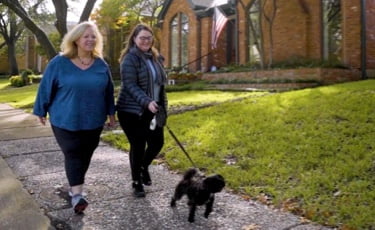
Caroline (Actual Patient) & Her Mother
Resources for teens and young adults
Whether navigating school, work, or relationships, being honest about needs and voicing concerns to the healthcare team are critical to staying healthy.
Addressing uncomfortable topics
How to talk to others about your condition
Speaking openly with others about acute lymphoblastic leukemia (ALL) or lymphoblastic lymphoma (LBL) can be scary. Finding a counselor or nurse specialist on Cancer.net may help support mental well-being.
Diet and exercise with ALL and LBL
Treatment-related side effects may affect appetite or energy. Visit LLS.org to find information on individualized plans that can lead to positive change. Please speak with the healthcare team before starting any new exercise or nutrition regimen.
Jazz Pharmaceuticals is not responsible for the content included in these resources. The organizations above are independent from Jazz Pharmaceuticals.
Be mindful of self-care
The power to find better care is possible. Write down questions before an appointment to remember what to ask, phone a trusted friend or family member to vent, and tell the healthcare team when something feels off.
Some days will be easier than others. Take time to relax the mind and body through meditation or breath work. Ask the healthcare team for a list of activities or resources that can help to bring relief.
Patient experiences: Caroline’s story
Caroline shares her experience living with ALL and receiving treatment with RYLAZE.
Cancer support and advocacy
Community support for those living with cancer extends beyond just ALL and LBL. Starting with these resources may help inspire conversations with the healthcare team.
The Bloodline with LLS podcast
Listen in as experts and patients discuss diagnosis, therapy, and resources available to patients with blood cancer.
Get Busy Living with #StupidCancer
Stupid Cancer helps empower everyone affected by adolescent and young adult (AYA) cancer by ending isolation and building community. Through innovative online and in-person programming, Stupid Cancer provides age-appropriate information and resources and builds connections in the AYA community so patients, survivors, caregivers, and professionals can Get Busy Living.
Raise A Voice survivors podcast
Childhood cancer survivor, Kate Blair, shares her journey and encouragement for teens on making a difference in their communities.
Jazz Pharmaceuticals is not responsible for the content included in these resources. The organizations above are independent from Jazz Pharmaceuticals.
